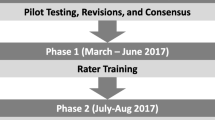Abstract
Work rounds have received little atention in the medical education literature. At the outset of the second post graduate year, medical residents are expected to function, without much guidance, as both team leaders and teacher. New York State health code regulation 405 restrict house staff work hours and may influence the manner and content of work rounds. The goals of work rounds were identified through a literature review and our own experiences. A 36-item questionnaire utilizing the identified goals was used in this crosssectional descriptive study. The participants were the Program Directors of New York State Internal Medicine residency programs. Each of the fourteen goals identified reflects one of three resident behaviors: patient care, teaching, and evaluation. The goals that received the highest impotance scores were patient management and updating team leader of events. Nineyty percent (90%) or more of the participants indicated that patient management, teaching clinical reasoning and problem solving, verifying important chart data, and verifying physical examination should be performed “often” or «lmost always.” Most programs emplyed verba instructions but only few held conference or provided literature on the expectations and conduct of work rounds. New York State Internal Medicine program directors perceive work rounds as primarily a patient care task, and many rely on verbal instructions to convey the objectives to the house staff. While previous research has demonstrated that work rounds are an important setting for house staff education, this study reveals that in most new York State programs this opportunity may be missed.
Similar content being viewed by others
References
Camp AK, Hoban JD, and Katz P, A Course on Teaching for House Officers.J Med Educ 60:140–142, 1985.
Jewtt LS, Greenberg LW, and Goldberg RM, Teaching Resident How To Teach: A One-year Study,J Med Educ 57:361–366, 1982.
Nerenz D, Rosman H, Newcomb C, Bolton MD, Gustavo H, Simmer T, and Goldstein S, The On-Call Experience of Interns in Internal Medicine,Arch Intern Med 150:2294–2297, 1990.
Brown RS, House Staff Attitudes Toward Teaching.J Med Educ 45: 156–159, 1970.
1992–1993 Directory of Graduate Medical Education Programs. Chicago: Accreditation Council for Graduate Medical Education, American Medical Association, 1991. Pp. 45–47.
Wilkerson L, Lesky L, and Medio FJ, The Resident as Teacher During Work Rounds.J Med Educ 61: 823–829, 1986.
Wray NP, Friedland JA, Ashton CM, Scheurich J, and Zollo AJ. Characteristic of House Staff Work Rounds On Two Academic General Medicine Services.J Med Educ 61:893–900, 1986.
Schwenk TL, Whitman NA:Residents as Teachers: A Guide to Educational Practice. Salt Lake City: University of Utah School of Medicine, 1984. Pp. 1–5, 25–32.
Tonesk X, The House Officer as a Teacher: What Medical Schools Expect and Measure.J. Med Educ 54:613–616, 1979.
Author information
Authors and Affiliations
Rights and permissions
About this article
Cite this article
Boutros, A., Della Ratta, R.K. Internal medicine program directors' perceptions of resident work rounds. J Community Health 19, 231–238 (1994). https://doi.org/10.1007/BF02260383
Issue Date:
DOI: https://doi.org/10.1007/BF02260383




